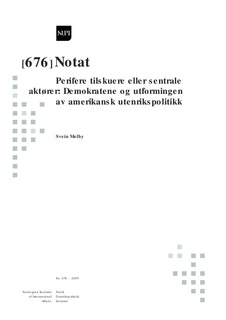| dc.contributor.author | Melby, Svein | |
| dc.date.accessioned | 2016-07-01T11:46:39Z | |
| dc.date.accessioned | 2016-10-04T11:46:58Z | |
| dc.date.available | 2016-07-01T11:46:39Z | |
| dc.date.available | 2016-10-04T11:46:58Z | |
| dc.date.issued | 2005 | |
| dc.identifier.citation | Working Paper, NUPI. 44 p. NUPI, 2005 | |
| dc.identifier.uri | http://hdl.handle.net/11250/2412789 | |
| dc.description | - | |
| dc.description.abstract | In critically important parts of the cold war era the Democratic Party was the steward of American foreign policy. But since September 11. 2001, the party has, however, mostly been a bystander to the major transformation of U.S. foreign policy carried out by the Bush administration. Will the party continue to play such a passive and reactive role or will it be able to formulate a coherent and realistic alternative the Bush foreign policy? Both the U.S. international behavior and world politics will be greatly affected by the outcome of the ongoing internal debate in the party. This paper takes a closer look at this debate and the various fractions that now compete for being the foreign policy face of the party. It is still too early to tell the outcome of this jockeying for power, and consequently the Bush administration will most likely continue as the dominant force behind American foreign policy. | |
| dc.language.iso | nor | |
| dc.title | Perifere tilskuere eller sentrale aktører: Demokratene og utformingen av amerikansk utenrikspolitikk | |
| dc.type | Research report | |
| dc.date.updated | 2016-07-01T11:46:39Z | |
| dc.identifier.cristin | 1365657 | |
